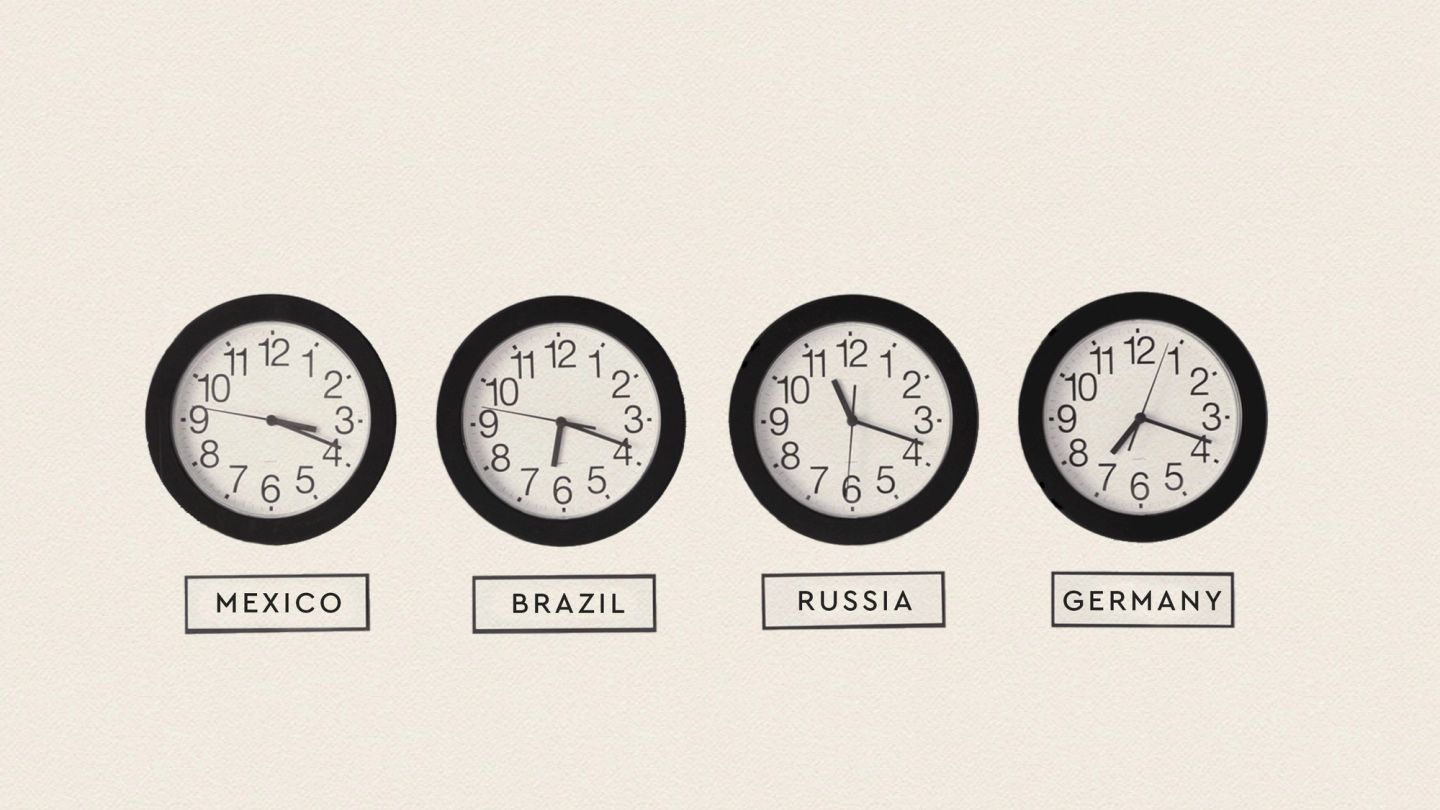

The gentleman’s guide to global business etiquette
From gifts and greetings to punctuality and pitching, navigate the tricky landscape of international business travel
Words: Sam Rider
In an age of President Trump and his questionable approach to foreign affairs, minding your Ps and Qs has never been more important when it comes to global relations.
It can be all too easy to fall into the many potential pitfalls of international etiquette. A nod may mean “yes” in one place and “no” in another. Where a particular number can be lucky for some, it can be a fearful omen for others. Gifts, while well-meaning, could take a turn if accidentally presented in a colour that signifies bad luck, or even death.
So it’s little wonder international etiquette has become big business. Experts have sprung up all over the globe to help would-be business people navigate the murky waters of traditions, cultures and superstitions. To ensure you don’t leave your next business trip red-faced or black-listed, we’ve tracked down the leading experts in international relations to help you avoid a global scandal…
In the United States, avoid political conversation
- “In today’s politically explosive climate, you need to do your homework before your business trip,” says Lydia Ramsey, US-based business etiquette expert, professional speaker and author. The first rule: avoid political debates at all costs.
- “Resist the urge to push your views,” says Ramsey. “If on the receiving end of a rant, let it pass or deflect it with humour. The less said, the better, and humour is a wonderful deflector.”
- According to Today Translations, business consultants and translation experts, “it is not considered vulgar to eat while walking down the street in the US,” you should be prepared to play golf and talk business simultaneously and, unlike many cultures, it’s perfectly acceptable to refuse food or drink without causing offence.
Do… adopt sports speak when talking shop. Sprinkle your pitch with terms such as “touch base”, “call the shots”, “ballpark figures” and “game plan”.
Don’t… invade personal space. “The standard space between you and your counterpart should be two feet. Most executives will be uncomfortable standing any closer.”
In Mexico, don’t be too abrasive
- “Mexicans embrace the ‘manana attitude’,” says Ramsey. “They’re typically warm and gracious and don’t adhere to the ‘time-is-money’ mentality of the US.”
- “The old Mexican saying is that ‘North Americans live to work. Mexicans work to live!’ so respect their sense of time and traditions.”
Do… be sensitive to the pace and tone used in Mexico.
Don’t… be overly forceful, aggressive or use a sharp tone of voice.
In Brazil, don’t shy away from a hug
- Brazilians have a famous saying, “To our friends, everything. To others, the law”, so be sure to build a strong rapport before pushing any business dealings, urges William Hanson, the UK’s leading etiquette coach and expert.
- Like in Italy and Mexico, punctuality is rather relaxed. Be on time but don’t be surprised if your host is 15-30 minutes late and schedule extra time between meetings since they’re often delayed or cancelled without warning.
Do… prepare for thoroughly tactile interactions. Hugging and back slapping is quite common.
Don’t… present any purple or black gifts, as these colours are associated with funerals and mourning.
In Russia, don’t say no to a drink
- “Moscow has had a lot of bad press of late,” says Hanson. “Business is formal but the culture is more open and cosmopolitan than you’d believe.”
- Just don’t take too many liberties online. “When applying for a visa, be aware that you’re asked for your social media accounts,” says Hanson. “Watch what you post or it could come back to bite you.”
Do… come bearing gifts – and line your stomach. Russia retains a heavy drinking culture.
Don’t… get drawn into political debate. “It’s always a thorny issue so it’s best to avoid the subject altogether,” Hanson adds.
In Germany, make sure you're on time
- “Germans do not like surprises,” warns Ramsey. “Sudden changes in business transactions, even if they may improve the outcome, are unwelcome.”
- Expect every detail of a project to be scrutinised. “The German thought process is extremely thorough,” she adds. “This can be very time-intensive but once the planning is over, a project will move very quickly and deadlines are expected to be honoured.”
- “In business meetings, age takes precedence over youth,” Ramsey says. “If you’re in a group setting, the oldest person enters first.”
Do… be punctual, whether for business or social. “Being late, even by just a few minutes, is considered very insulting,” says Ramsey.
Don’t… whatever you do, don’t try to one-up your German counterpart, as Boris Johnson did by headbutting former footballer Maurizio Gaudino’s groin in a 2006 celebrity charity match between England and Germany. In fact, when it comes to international etiquette, it’s invariably best to do the exact opposite.
In India, bring flowers
- “In India it’s customary to eat with your hands – specifically your right,” says Paul Russell, co-founder and director of Luxury Academy London, a multinational private training company with offices in the UK and India. “The other hand is reserved for wiping – and I don’t mean the table.”
- Be careful with even the simple gesture of nodding your head, stresses Ramsey. “Nodding your head up and down generally means ‘no’ while shaking your head side to side means ‘yes’. The hand gesture Americans use to signal ‘okay’ can be viewed as obscene.”
Do… present flowers or sweets as a gift for your host. These are typically set aside and opened once you’ve left.
Don’t… touch someone else’s head, even to pat the hair of a child. The head is considered the seat of the soul.
In Hong Kong, beware the number four
- Being part of China, yet with its own political and economic independence, the culture in Hong Kong has similarities to China with added western influences, explains Russell. “Hierarchy and honour are very important and should always be respected.”
- As with China, the number four symbolises death, while three means life. Remember this when presenting gifts that come in multiples.
Do… show some mild resistance if you’re offered the central seat during dinner, says Russell. “It’s considered an honour.”
Don’t… use your index finger to summon a waiter, he adds. “This is as unforgivable as snapping your fingers in Europe. In Hong Kong you’d use your index finger to summon animals.”
In South Korea, don’t set time limits
- “Koreans are clever, forceful negotiators,” says Ramsey. “They are not conditioned by any sense of fair play, of not taking advantage of a weaker adversary. They will take all they can get.”
- “Koreans will not – or cannot – come to an agreement until they feel comfortable with the people involved, that is, until they like and trust them,” she adds.
Do… create a friendly, positive feeling. “An uninhibited night out on the town is almost always worth several days of hard bargaining in the boardroom,” says Ramsey.
Don’t… let the Korean side know when you’re scheduled to leave, Ramsey adds. “Koreans will invariably delay a decision until the last second, putting you under tremendous pressure to make last-minute concessions so you don’t go home empty-handed.”
In Japan, bond over karaoke
- “Treat any business cards you receive with the utmost respect,” warns Ramsey. “In Japan, China and Singapore, a simple thing like writing your phone number on the back of their card can be misinterpreted as a huge insult.”
- The business card is considered an extension of themselves, explains Hanson. “Certainly don’t write on it. Don’t fold it up. Don’t shove it in your back pocket. Take time to read both sides carefully and then put it back in your business card holder as a mark of respect.”
- “You’ll also be expected to exchange your card with theirs so carry heavy and take pride when handing yours over,” Ramsey adds. “Use both hands and if you’re serious about doing business in their country, have them printed in their language too.”
Do… karaoke. “It’s a chance to bond socially and professionally,” explains Hanson. “And it can be seen as quite rude to say no when offered this hospitality.”
Don’t… call business colleagues by their first names. “Japanese acquaintances should always be addressed by their title or by their last name with the prefix ‘san’,” says Ramsey.
In China, pretend you’re a vegetarian
- “If you’re presented with a gift, be sure to refuse it twice before accepting,” says Russell. “Accepting it first time like we do in Europe would be considered monstrously rude. If you take a gift, wrap it in red or gold which is considered good luck.”
- “If you’re presenting gifts of any kind, it’s considered unlucky to give anything in sets of four,” says JoJo Fung, Consumer Marketing Executive at G Adventures. “The word for four is similar to the word for death.”
- “The same is true for clocks, straw sandals, a stork or crane, handkerchiefs and anything white, blue or black,” says Ramsey. Did we mention the Chinese are a superstitious bunch?
- “Always leave a few leftovers on your plate when dining,” says Hanson. “If you eat all your meal, the Chinese will assume you didn’t receive enough food and are still hungry.”
- Can’t stomach a second helping of the questionable local delicacy? “Say you’re vegetarian from the get-go,” says Hanson, remembering the time he was offered spiced duck blood curd on a recent visit to Beijing. “Just be careful not to get caught out in the breakfast buffet tucking into the full English, sausages and the rest, like I did the next morning.”
Do… taste all the dishes you’re offered as a cultural courtesy.
Don’t… ever place your chopsticks straight up in your bowl. Placing your sticks upright will remind your host of joss sticks which connote death.
In the Middle East, ensure you sit correctly
- “In the Middle East, it’s considered rude to show the soles of your feet, even if you’re wearing shoes,” says Tom Lloyd-Jones, Chief Experience Officer at G Adventures for the region. “In meetings, keep your feet flat to the floor to avoid showing the bottoms to anyone else in the room.”
- To sit in a figure-four – a crossed-leg position with your ankle resting on your knee – is a huge no-no, adds Ramsey.
- “The culture in Saudi Arabia can be unfathomable to outsiders, particularly in attitudes to women,” says Russell. “Be cautious in both what you wear and how you behave, but also be ready for some table manners most Europeans would find extremely rude.”
Do… sit the European way – knee over knee so the soles of your shoes face the floor.
Don’t… be offended if your host belches after dinner. “It’s considered a show of appreciation for the dish,” says Russell.
In Australia, offer to pay for the next round
- “Australians don’t find it hard to say ‘no’ if they’re not on board so don’t beat around the bush with your pitch. Dive straight in,” says Ramsey.
- “Greetings are typically casual and relaxed – a handshake and a smile are appropriate,” she adds. “But resist impersonations of the accent. A simple ‘hello’ is much safer than a strained ‘g’day’.”
Do… drink Australian and offer to pay for a round of “schooners” if you’re invited out.
Don’t… ask indigenous Australians if they’re “still throwing spears” – as the ever-politically incorrect Prince Philip did back in 2002.
Looking for more career advice? Here's how to negotiate a pay rise...


